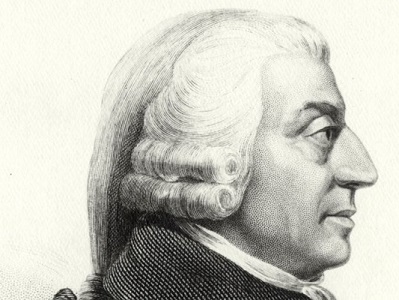An Animal That Trades

A five-part short video series on the life and contemporary relevance of Adam Smith.
This video series, produced by AdamSmithWorks, can be watch as a full 38-minute feature, or in five thematic, classroom-friendly chunks. To access all, click here.
Below are some discussion prompts related to this video:
1. Who do you care for most in the world, and why?
2. How do you know whom to trust? How might you go about teaching someone how to know this?
3. What do you think makes people naturally sociable?
4. The narrator claims that economists today are more often seen as “fortune tellers” or “stockbrokers.” How did Adam Smith see himself by contrast? Do you think this characterization of economists today is correct? Why or why not?
5. What is the real “moral” of the story of the poor man’s son told by Smith?
6. The narrator describes the “spontaneous pattern” of the invisible hand as amoral. To what extent do you really believe such an outcome is amoral, even if spontaneous?
7. The episode ends with Smith’s caution regarding the “pursuit of wealth and greatness.” Is such a pursuit unequivocally bad? Why or why not?
8. Does wealth contribute nothing to happiness? Explain.
1. What were the main tenets of the physiocrats, who the Smith spent time with during his tenure in France? What did laissez-faire mean to them? What does it mean today?
2. How did the British think the East India Tea Company contributed to the wealth of the nation? Are there any analogs you can think of in today’s world?
3. The narrator obliquely describes what economists today would call this a zero-sum game, but he leaves something to the viewer to interpret. That is, how does a market grow?
4. Smith pointed out that tariffs intended to help a particular group of producers often impacted a whole range of others. Who might some of these “others” be, and how might tariffs affect them?
5. We learn from Smith that, “Each nation has some advantage over another” when it comes to production. How do imports diminish a nations’ wealth? Why do you think this continues to be such a counter-intuitive concept?
6. How is exporting (or importing) service different from exporting (or importing) goods? Why have so many call centers migrated to India, for example?
1. The narrator challenges us to imagine our lives without the constant exchange of others. Can you list all the people with whom you’ve exchanged today?
2. Smith described the advantages to a nation “as societies grow and the market expands,” and offers a plethora of examples from his own time. How else do markets expand, beyond reasons tied to population and territorial expansion?
3. How does increased specialization lead to innovation?
4. What gives rise to the division of labor, if not for the human mind? (Hint: You may wish to explore Diderot’s pin factory for some inspiration here…)
5 The film takes us to life in a garment factory in modern-day Ethiopia, and the narrator points out that the workers’ “lives have changed drastically over the past decade.” To what extent are these changes net positive? Explain.
6 What does Smith mean when he says, “The market alone may not ensure positive outcomes for all?” What else should the government do to ensure that the its citizens’ quality of life rises?
1. Can you recall an instance in which you shared the reaction of total strangers from afar? What as it like? How did you feel? What prompted it?
2. What is the difference between “self-interest” and “selfishness?” (Hint: you may want to look at this ASW original essay for some inspiration…)
3. Smith says we naturally feel sympathy when we discover news of a disaster in a far-off land, such as a tsunami or an earthquake. What prompts this reaction in us? How do you think this has changed since Smith’s day, particularly with the advent of technology? Explain.
4 How does trade civilize us, according to Smith?
1. What is the “cobra effect?” Economists often refer to this effect simply as unintended consequences. What other examples can you think of that illustrate this effect? How might these effects be mitigated?
2. Jurisprudence is a less common word today. The narrator tells us by jurisprudence, Smith meant “rules by which civil government ought to be directed.” What does it mean to you today?
3. What are the primary roles of government, according to Smith? To what extent do nations abide by these roles today? Explain.
4. What does it mean to think of society as a “mechanism,” as the narrator describes the French Enlightenment thinkers? What’s wrong with thinking of society in this way?
5. What kind of protection do entrepreneurs like Manilla’s train track taxis deserve? How can the governing body ensure enough room for innovation while still offering protection to its people?
6. What are the criteria Smith thought necessary to justify public works? How reasonable do you think these criteria are?
7. How is an educated public a benefit to society? How much education did Smith think needed to be provided to ensure this? How much do you think is necessary today, and why?
8. What responsibilities do you have to yourself with regard to justice, according to Smith? Do you find this reasonable? Why or why not?

